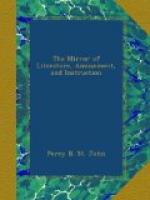Such is the skill of that wonderful being, the tailor, that his transformations are not more extraordinary than sudden. The time which is occupied in thus new-moulding the human frame is really trivial compared with the stupendous change which is literally wrought. It is true, the soul may remain the same, but a new body is actually given to it by the interposition of vestiary talent: and this is what we have always believed to be the genuine meaning of the metempsychosis of Pythagoras.
It is not, therefore, without the most cogent reasons that we assert our opinion, that the distich of Pope, “Worth makes the man,” or the title appended by Colley Cibber to one of his dramas, “Love makes the man,” ought henceforth to yield, in point of truth, to the irrefragable principle which we here solemnly advance, “that it is the tailor makes the man.”—Blackwood’s Magazine.
* * * * *
THE ACTOR.
Perhaps Fortune does not buffet any set of beings with more industry, and withal less effect, than Actors. There may be something in the habitual mutability of their feelings that evades the blow; they live, in a great measure, out of this dull sphere, “which men call earth;” they assume the dress, the tone, the gait of emperors, kings, nobles; the world slides, and they mark it not. The Actor leaves his home, and forgets every domestic exigence in the temporary government of a state, or overthrow of a tyrant; he is completely out of the real world until the dropping of the curtain. The time likewise not spent on the stage is passed in preparation for the night; and thus the shafts of fate glance from our Actor like swan-shot from an elephant, If struck at all, the barb must pierce the bones, and quiver in the marrow.
Our Actor—mind, we are speaking of players in the mass—is the most joyous, careless, superficial flutterer in existence. He knows every thing, yet has learned nothing; he has played at ducks and drakes over every rivulet of information, yet never plunged inch-deep into any thing beyond a play-book, or Joe Miller’s jests. If he venture a scrap of Latin, be sure there is among his luggage a dictionary of quotations; if he speak of history,—why he has played in Richard and Coriolanus. The stage is with him the fixed orb around which the whole world revolves; there is nothing worthy of a moment’s devotion one hundred yards from the green-room. It is amusing to perceive how blind, how dead, is our real Actor to the stir and turmoil of politics; he will turn from a Salamanca to admire a Sir John Brute’s wig; Waterloo sinks into insignificance before the amber-headed cane of a Sir Peter Teazle. What is St. Stephen’s to him—what the memory of Burke and Chatham? To be sure, Sheridan is well remembered; but then Sheridan wrote the Critic.




